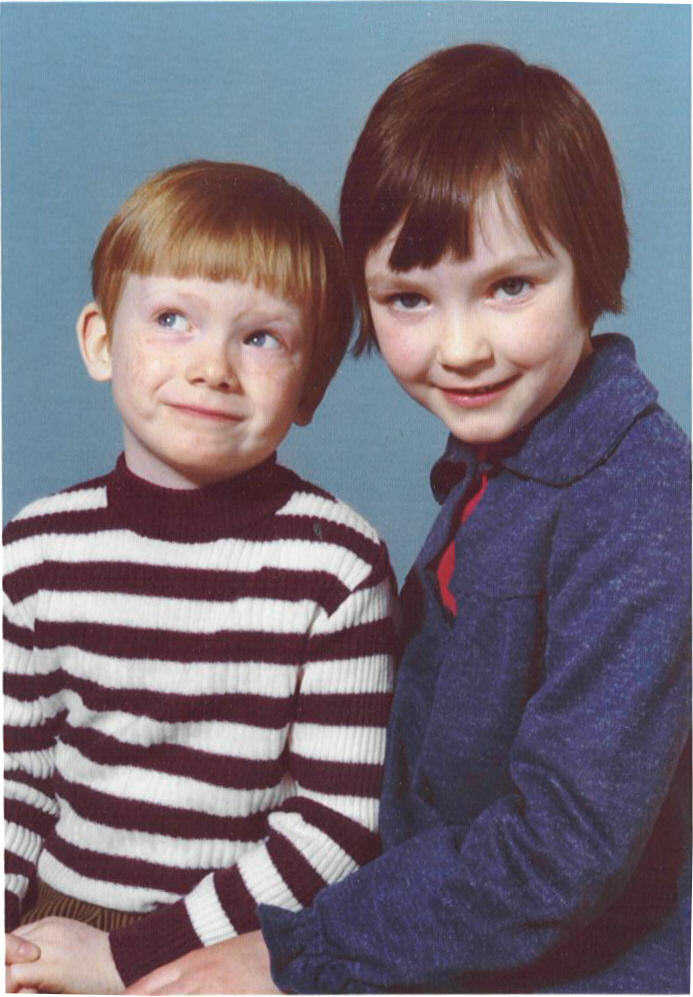
When I was a little boy, a school photographer took a picture
of me and my big sister, Juliet, together. Her gaze was focussed
right where it should be, on the camera, but I was staring off
into the distance. Her teachers asked her 'What is your little
brother looking at?' It was so long ago that I don't remember
the answer myself, but it show that I haven't changed a bit:
always trying to catch a glimpse of some distant image.

I've always had a vivid imagination, and an appetite for
stories. I'm a Catholic, and Catholicism is a religion that
promotes a healthy imagination. But, like all religions,
Catholicism aspires to offer more than fantasies, it claims to
put us in touch with reality - and, at least since I read the
first chapter of Hilary Putnam's Reason Truth and History, when I was about ten
or eleven years old, I've been fascinated by questions about the
limits of reality. As my education continued, at St. Bede's College
in Manchester, I learned to put a name to these questions -
'Philosophy'.
My father, Edmund Murphy, has a Ph.D. in Physics. He still
regrets the fact that he lent me a Philosophy book to read, and
not a work of Natural Science. My mother, Pauline Murphy, only
encouraged me further by lending me a copy of Plato's Republic when I was about
thirteen years old.
I was lucky enough to be admitted to study Philosophy and
Theology in the University of
Oxford, and I returned as a graduate student to study
Philosophical Theology, supervised by Richard Swinburne. My
research was deeply influenced by the work of Michael Dummett,
who has claimed that metaphysical questions are, properly
understood, questions about the correct logical laws. These
questions can be settled by supplying a correct theory of
meaning. In my research, I applied these philosophical ideas to
debates about the nature of religious language or, more
specifically, language about God within monotheistic traditions.
In the course of this study, I obtained a deeper appreciation of
the importance of historical study for understanding religions,
an appreciation I try to pass on to my students today.
After four years of study, I completed my doctoral thesis,
and handed it in. There was a couple of months to wait before my
viva voce examination,
during which time I grew to hate every sentence that I had
written, and to wish that I could burn every copy of the
abominable document so that not a trace would be left. The night
before the viva, I
made my way across Port Meadow, then on through the country
lanes, to the little chapel of St. Margaret, where I found true
peace of mind: I left with a strong sense that God's strength
would see me through any problems, even the shame of failure and
the waste of all that my parents had invested in my education.
The next day, to my great surprise, my examiners seemed to
like my thesis and I obtained my degree. I've re-read it since,
and perhaps it wasn't quite as bad as I thought. After a year
spent scraping a living by teaching tutorials wherever I could,
I was invited to spend a week in Nicaragua, where there was a
job opening. I was met at the airport by the Dean, Dr. Silvio Sirias and his
wife, Erinn
Magee. After two years in Nicaragua, I decided to join
Silvio and Erinn in a move to Florida State
University - Panama, where I now teach courses in
Philosophy and Religious Studies.
In 2011 I met the love
of my life, Rocío Grimaldo, who was teaching here part-time.
Rocío has worked as a journalist for La Prensa, Panama’s
leading newspaper, and been a professional speech-writer.
We married on the 17th August, 2013, and spent our honeymoon
in Peru. Now I’m still gazing off into the future – whatever
it holds, I know that the two of us will meet it together.
There is no mountain we cannot climb together.

Return to Benjamin Murphy's home
page.